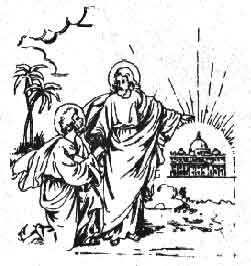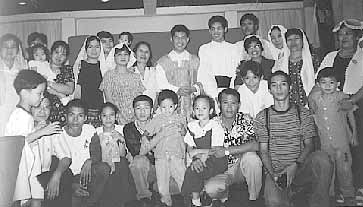

![]()
![]()
|
Newsletter of the District of Asia September-October 1999 Editorial “Thou art Peter and upon this Rock I shall build My Church, and the gates of hell shall not prevail against it” (Mt XVI, 18). Dear Friends and Benefactors, Last May 12, another document was signed by high ranked Church authorities which should cause any informed Catholic much worries. This document must be seen in the line of other documents and meetings that have taken place in the last years on the subject of Papal Primacy. In December 1996, a Symposium was held in Rome on this issue. Last November 18, 1998, the Sacred Congregation for the Doctrine of the Faith published in the Osservatore Romano some reflections, by Cardinal Ratzinger and his secretary, on this theme. Now, another step ‘forward’ has been made with the latest May document. The title of this document should be understood in the light of the rules of discernment of spirits: all that shine isn’t gold! The document’s title is “Donum Auctoritatis - The gift of Authority” as it deals with authority in the Church. The cause of the worries is that this document was jointly prepared and approved by the Roman Catholic Church and the Anglican Church, through the ‘Anglican Roman Catholic International Commission,’ known as ARCIC for short. The document is a good example of how to use well-known words but changing and emptying them of their usual meaning. This is actually said explicitly in the first of two notes at the end of the document, following the list of members of the commission. Here is the note: In accord with ecumenical usage, the capitalized word “Tradition” here refers to "the Gospel itself, transmitted from generation to generation in and by the Church," while the uncapitalised word ‘tradition’ refers to "the traditionary process," the handing-on of the revealed truth (The Fourth World Conference on Faith and Order, Montreal 1963, Section II, para. 39). The plural ‘traditions’ refers to the peculiar features of liturgy, theology, canonical and ecclesial life in the various cultures and faith communities. These uses, however, often cannot be sharply distinguished. When 'tradition' is capitalized at the beginning of a sentence, context must determine sense. The phrase ‘apostolic Tradition’ refers to the content of what has been transmitted from apostolic times and continues to be the foundation of Christian life and theology. It is truly ironic that in such a Vatican approved document - the product of five years of dialogue, patient listening, study and prayer - the definition of the very word Tradition is taken from Protestantism: “the Gospel itself”, that is, Sola Scriptura. For it is for the same word, in its true Catholic sense however, that Archbishop Lefebvre was condemned in 1988! In Ecclesia Dei Adflicta, Archbishop Lefebvre was said not to have the right notion of Tradition, of ‘Living Tradition’. Now, we know why! We need to ask the successors of Henry VIII to tell us the new meaning of Tradition! Miserere mei, Deus! In paragraph 14 of Donum Auctoritatis, on ‘Tradition and Authority,’ we are also deep in Protestant teaching, echoed in the expression so dear to modern Church authorities of ‘Living Tradition’: 14. (…) Tradition is a dynamic process, communicating to each generation what was delivered once for all to the apostolic community. Tradition is far more than the transmission of true propositions concerning salvation. A minimalist understanding of Tradition that would limit it to a storehouse of doctrine and ecclesial decisions is insufficient. The Church receives, and must hand on, all those elements that are constitutive of ecclesial communion: baptism, confession of the apostolic faith, celebration of the Eucharist, leadership by an apostolic ministry.
We are down here to only 2 sacraments constitutive of the ecclesial communion: baptism and the celebration of the Eucharist ! Are the other 5 Sacraments not also constitutive of the Church? Council of Trent, Session 7, Can. 1: If anyone says that the sacraments of the New Law were not all instituted by our Lord Jesus Christ, or that there are more or less than seven, namely, baptism, confirmation, Eucharist, penance, extreme unction, order and matrimony, or that any one of these seven is not truly and intrinsically a sacrament, let him be anathema. Let us move on to the purpose of this document: the Primacy of the Pope. I come to the practical conclusion of many pages. In no. 57, dealing with the issues facing Roman Catholics, the well known principle of false democracy is applied at all level not only of the Church but also with regards to other denominations. Collegiality is interpreted as the right of everyone to get involved in the decision making process: bishops, clergy, laity, and even non Catholics. Since “above all, how will the Roman Catholic Church address the question of universal primacy as it emerges from "the patient and fraternal dialogue" about the exercise of the office of the Bishop of Rome to which John Paul II has invited “church leaders and their theologians”? That means that we should ask non-Catholic “church leaders and their theologians” how we should understand the Primacy. It sounds very much like asking the same “church leaders and their theologians” how we should understand the Holy Sacrifice of the Mass, what prayers we should remove, etc. Doesn’t this ring a bell? Then, “for the sake of ‘koinonia’ and a united Christian witness to the world, Anglican and Roman Catholic bishops should find ways of cooperating and developing relationships of mutual accountability in their exercise of oversight’. (No.58) How? Common meetings should be organized between Catholic bishops and Anglican ‘bishops’, “serious consideration could also be given to the association of Anglican bishops with Roman Catholic bishops in their ad limina visits to Rome. Wherever possible, bishops should take the opportunity of teaching and acting together in matters of faith and morals” (no.59) In matters of faith and moral? Only the Catholic Church has the true faith. Only the Catholic Church keeps faithfully the Ten Commandments. The Anglicans recognize only two sacraments, deny the value of good works, the role of Our Lady, the existence of Purgatory, etc. They accept abortion, contraception. Now, we should “take the opportunity of teaching and acting together in matters of faith and morals”??? Finally, ‘in cauda venenum – poison is in the tail,’ in the last 3 paragraphs of the text, the Primacy given to Peter and his successors is redefined in its nature and in its exercise. A new type of pope is in the making here. Read on: 60. (…) We envisage a primacy that will even now help to uphold the legitimate diversity of traditions, strengthening and safeguarding them in fidelity to the Gospel. It will encourage the churches in their mission. This sort of primacy will already assist the Church on earth to be the authentic catholic ‘koinonia’ in which unity does not curtail diversity, and diversity does not endanger but enhances unity. It will be an effective sign for all Christians as to how this gift of God builds up that unity for which Christ prayed. 61. Such a universal primate will exercise leadership in the world and also in both communions, addressing them in a prophetic way. He will promote the common good in ways that are not constrained by sectional interests, and offer a continuing and distinctive teaching ministry, particularly in addressing difficult theological and moral issues. A universal primacy of this style will welcome and protect theological enquiry and other forms of the search for truth, so that their results may enrich and strengthen both human wisdom and the Church's faith. Such a universal primacy might gather the churches in various ways for consultation and discussion. Did Our Lord Jesus Christ not found a Church 1966 years ago? Has he not given to Peter the duty to feed the sheep i.e. all the bishops? Where has this Church been for the last 2000 years if we should begin only now to define its primate? Has the world, the Church, just begun? It seems so by reading the above text. “Let’s start all over again!” Such is the profound meaning of the word: r-e-v-o-l-u-t-i-o-n It was certainly in view of such errors that Vatican I condemned infallibly, already in 1870, the role of the Pope understood simply as a primate of honor, a sort of president, arbiter, guaranteeing peace among believers: (Canon) Therefore, if anyone says that blessed Peter the apostle was not appointed by Christ the Lord as prince of all the apostles and visible head of the whole Church militant; or that it was a primacy of honor only and not one of true and proper jurisdiction that he directly and immediately received from Our Lord Jesus Christ himself: let him be anathema. (Denz.S 3055) During the very years of Vatican II, from November 1962 until the end of 1965, a highly respectable Italian epigraphist, Dr. Margherita Guarducci, with the help of one of Italy’s most famous anthropologist, Dr. Venerando Correnti, succeeded in identifying the bones of the Apostle St Peter, which had been lying since the first century underneath the main altar of St Peter’s basilica. All the objections against the authenticity of the relics were answered authoritatively by Dr. Guarducci. There were no escape. These were the bones of Peter. Peter did come to Rome, did die in Rome, upon his tomb Constantine did build the first Basilica in honor of the Prince of the Apost.les. Dr. Guarducci, who died only a few years ago, brought these interesting facts to light at the moment when ecumenism was beginning to undermine the Rock. Sadly enough, but not surprisingly, Dr. Guarducci gradually became persona non grata in the Vatican. She was not even allowed at the end to visit the excavations underneath St Peter’s. I highly recommend the reading of the wonderful book of J.E. Walsh The Bones of St Peter (available from Our Lady of Victories [make checks payable to St. Thomas Aquinas Book Center] for P250 – in the Philippines -, or US$10 – outside the Philippines - post included). The author wrote this book in the early 1980s, thus having a great abundance of material available. It strengthens one’s faith in Rome, in Romanitas, in the Rock upon which Our Lord Jesus Christ built His Church and which the gates of Hell will never succeed in destroying. “For it is a matter of necessity that every Church should agree with this Church, on account of its preeminent authority -- that is, the faithful everywhere -- inasmuch as the Apostolic Tradition has been preserved continuously by those who are everywhere. Ad hanc enim Ecclesiam propter potentiorem principalitatem necesse est omnem convenire ecclesiam, hoc est eos qui sunt undique fideles, in qua semper ab his qui sunt undique, conservata est ea quae est ab apostolis traditio.” - St Irenaeus
Fathers Soliman and Salvador pose with some of our faithful |


